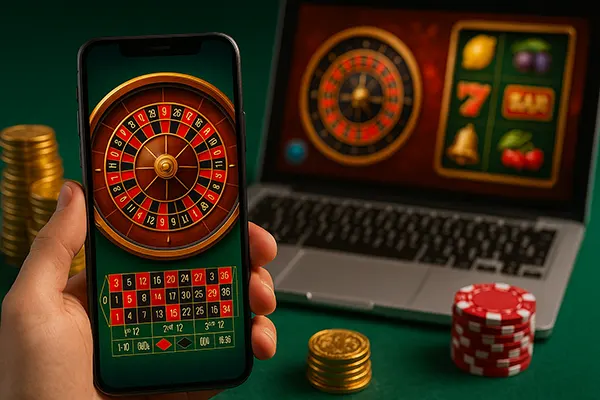
Mobile Casino Games: Do Winning Chances Differ from Desktop Versions?
The rapid development of mobile technology has transformed how people play casino games. Today, smartphones and tablets offer a smooth experience comparable to desktop versions, allowing players to enjoy slots, table games, and live dealer sessions on the go. One of the most common questions among players is whether the chances of winning differ between mobile and desktop. To answer this, it is important to examine how game software, licensing, and technical aspects work in practice.
How Casino Games Work Across Devices
Casino games, whether slots or table classics, are powered by Random Number Generators (RNGs). These RNGs are certified by independent testing laboratories such as eCOGRA or iTech Labs to ensure fairness. Importantly, the RNG does not change based on whether you play from a computer, tablet, or phone. This means the mathematics behind the game remains identical regardless of device.
Licensing authorities such as the UK Gambling Commission and Malta Gaming Authority require operators to use certified software across all platforms. Compliance ensures that mobile and desktop versions of the same game provide exactly the same return-to-player (RTP) percentage and odds. This consistency is crucial for building trust between operators and users.
Another key factor is cross-platform synchronisation. Leading software providers like NetEnt, Playtech, and Evolution design their games in HTML5, ensuring that both desktop and mobile players experience identical gameplay mechanics, bonus features, and payout structures.
Technical Aspects of Mobile vs Desktop
While the odds remain the same, mobile devices introduce unique technical considerations. Screen size and touch controls can slightly alter how users interact with the game. For example, mobile slots often feature simplified layouts to ensure buttons are large enough for touchscreen play. However, these changes are purely cosmetic and do not affect the underlying mathematics of the game.
Performance optimisation is another difference. Mobile games are designed to use less processing power and adapt to various internet speeds. This ensures that even with weaker connections, the fairness of the game is preserved. Loading times may vary, but payouts and probabilities remain identical.
Battery consumption and operating system compatibility also come into play. Games are tested extensively to ensure that iOS and Android versions deliver the same outcome as desktop versions. Regulators monitor compliance, making it nearly impossible for an operator to alter RTP depending on the device.
Fairness and Transparency in Mobile Gaming
Transparency is a core requirement of modern online gambling regulations. Game providers must disclose the RTP of each title, and these figures apply equally across all devices. Whether you access a slot with 96% RTP on a desktop or a smartphone, the long-term statistical return is identical.
Independent audits reinforce this principle. Testing agencies simulate millions of spins or game rounds to confirm that actual results match the stated RTP. Their certifications explicitly cover all device versions of the game. This prevents operators from creating hidden advantages in one format over another.
Player protection tools, such as deposit limits and reality checks, are also accessible across platforms. This ensures that responsible gambling measures remain effective whether users play on the move or from a home computer.
Player Perceptions and Misconceptions
Despite the evidence, many players still suspect that mobile versions reduce their chances of winning. This perception often arises because shorter sessions on mobile may seem less rewarding compared to longer desktop play. Variance in slots, where long losing streaks are normal, can reinforce these doubts.
Another misconception is linked to connection stability. If a mobile game freezes due to weak internet, players sometimes believe their potential win was blocked. In reality, results are processed by the server before the visual outcome appears on the screen. This means the fairness is preserved even if the animation is interrupted.
Studies by industry regulators show no measurable difference in winning chances between mobile and desktop. Player confidence continues to grow as operators publish more information about how RNGs and audits function.

The Future of Mobile Casino Gaming
By 2025, mobile gambling represents more than half of the entire online casino market. Game developers prioritise mobile-first design, ensuring compatibility across devices without compromising fairness. This approach guarantees that future innovations will also remain aligned with regulatory requirements.
Live dealer games provide a strong example of this evolution. Whether streamed to a smartphone or a desktop, outcomes are determined by physical dealers and certified equipment, leaving no room for manipulation based on device. Providers like Evolution and Pragmatic Play continue to expand mobile live gaming without altering odds.
Advancements in 5G networks and improved device performance mean that mobile users now enjoy the same speed and graphics quality as desktop players. The future points towards an even more seamless experience, but fairness and chances of winning will remain regulated and identical across all formats.
Key Takeaways for Players
Players can be confident that choosing mobile over desktop does not alter their chances of success. The core factors—RNGs, RTP percentages, and regulatory standards—remain unchanged regardless of the device. Mobile versions are designed to be as fair as their desktop counterparts.
The only differences lie in convenience and accessibility. Mobile play allows users to enjoy quick sessions from anywhere, while desktop gaming may provide larger screens and longer session stability. These distinctions affect comfort but not fairness.
Ultimately, the choice between mobile and desktop should be based on personal preference. Both formats guarantee the same winning opportunities, ensuring players can focus on enjoyment rather than worrying about technical inequalities.





